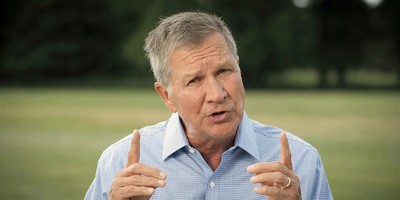The great Bernanke QE2 debate continues to heat up. In the run-up to the G-20 meetings, China, Russia, Germany and others have all come out against the Federal Reserve's quantitative-easing agenda. They don't want hot-money excess dollars to flow into their higher-yielding currencies.
The assault against Bernanke's easy money has reached such fever that President Obama felt it necessary to defend the $600 billion in new-money printing in a news conference in India.
Meanwhile, World Bank President Robert Zoellick has actually called for putting gold back into global money, in order to use it as an international reference point to measure market expectations over inflation or deflation. The former Treasury and State Department official wants a successor to Bretton Woods. To my way of thinking, Zoellick is dead-on right.
And then there's Kevin Warsh's opus op-ed in Monday's Wall Street Journal. I have written about Warsh and his sound-thinking views in the past. Taking a bit of a shot at Bernanke's QE2, the Fed board member basically says: Look, you want better growth, reform the tax code and stop regulating. "The Federal Reserve is not a repair shop for broken fiscal, trade or regulatory policies," he writes.
But in the key part of his op-ed, Warsh calls for a strictly limited QE2, not an open-ended commitment. He describes it as "necessarily limited, circumscribed and subject to regular review." And he goes on to say that if the dollar decline and run-up of commodity prices continues, these inflation signals should stop QE2, regardless of the unemployment rate.
It's noteworthy that both Zoellick and Warsh are using gold, commodities and the dollar as alarm signals -- market-based alarm signals -- that would warn the Fed if it's too loose.
Recommended
Since Bernanke first hinted at quantitative easing in late August, commodity indexes have jumped nearly 20 percent, gold has hit a new record high over $1,400 an ounce and the dollar has fallen nearly 10 percent against the euro. And riding the crest of easy-money expectations, stocks have increased just less than 20 percent. But is it real? Is it sustainable?
The fact is that Ben Bernanke, who seems wedded to an old-style monetarism, is looking at backward inflation signals such as the consumer price index. And here's the irony in Bernanke's monetarism. In the six months prior to April, the M2 money supply was flat. But since April, M2 has turned up rapidly at a 7 percent annual growth rate. So it looks like people are putting money to work as the whole economy may actually be heating up.
And notice that while M2 growth has surged, so have commodities and gold -- all while the dollar has been declining.
I'm not going to make a case for old-fashioned monetarism because we have learned that the velocity (or turnover) of money is unstable. Anyway, it's the King Dollar value of money that really counts. But I will note that as Bernanke's new monetarist experiment takes off, higher commodities and a rising money supply at the same time suggest the economic situation is taking a new turn. This new turn is likely to include a faster growth rate, especially if Washington keeps the George W. Bush tax rates down.
And it's quite possible that business confidence is improving with the election trends having become clear. Early October economic reports from the Institute for Supply Management for both manufacturing and services came in above expectations. The same was true for the October jobs report, with a more than 150,000 gain in payrolls. And car sales, especially light-truck sales, have picked up substantially. According to Auto Nation CEO Mike Jackson, rising pickup sales show that small businesses and entrepreneurs are going to work. (Hat tip to Mark Perry of the Carpe Diem blog.)
And then there are profits. The dominant economic fact behind the rise in stocks and a possible upturn in the rate of economic growth is a continuation of strong business profits across-the-board. This is the best and most durable form of stimulus coming from the private sector.
So I would say to Bernanke, be careful what you wish for. And I would say to Zoellick and Warsh, thank you for your sound-money contributions.

























Join the conversation as a VIP Member